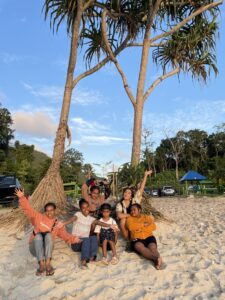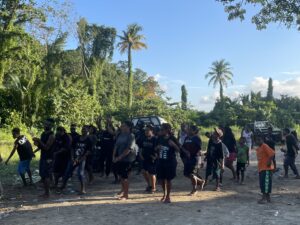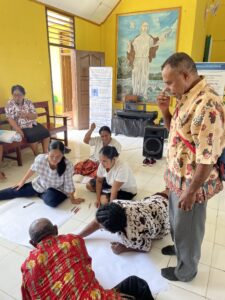Di bawa dalam Bahasa Indonesia, below in English
Generationen und Finanzen auf Papua
Etwas was mir hier aufgefallen ist:
Der Umgang mit Heranwachsenden (16-30J.) und Finanzen.

In Deutschland weiß ich, dass viele Haushalte Taschengelder einführen und den Kindern vom jungen Alter aus beibringen selbstständig mit ihren finanziellen Ausgaben umgehen zu können. Man erhält ein gewisses Budget und das muss man lernen mit seinen Ausgaben in Einklang zu bringen.
Ich muss gestehen, dass ich das von zuhause nicht so kenne. Bzw. Wir haben es einmal versucht, doch irgendwie haben wir wieder damit aufgehört. Ich denke meine Ausgaben waren immer über dem, was ich erhalten habe. Hehe.

Hier auf Papua merke ich, wie die Älteren regelmäßig bis sehr oft einem die Ausgaben übernehmen. Sei es, wenn es ums Essen, Transport, Aktivitäten, Snacks oder Ausflüge geht. Jedes mal, wenn ich mit jemand Älterem, wie einem älteren Bruder, Bapa, Onkel oder Pastor oder Pastorin unterwegs war haben sie immer mir ausgegeben. Anfangs war mir das etwas unangenehm, doch ich wollte nicht ablehnen, weil ich gespürt habe, dass mein Gegenüber das gerne gemacht hat.

Und irgendwann hat es klick gemacht: Die Älteren sorgen sich um die Jüngeren. So mein Gefühl jedenfalls. Und das eben in allen Bereichen meines Alltages. Es ist krass, wie stark ich hier aufgefangen werde und in jedem Belangen Hilfe und Unterstützung erhalte. Sei es ob ich mal eben Obst kaufen möchte und Om mein quasi Onkel hier alles Obst für mich bezahlt, zum Schneider will und meine Freundin den weiten Weg auf sich nimmt und mein „berteman“ – Begleitung ist, damit ich meine Sachen geschneidert bekomme.
Das alles geschieht ohne etwas als Gegenleistung zu erwarten. Ich weiß, dass es alle von Herzen gerne machen. Manchmal überlege ich im Moment etwas zurückzugeben, doch ich merke, wie es nicht erwartet wird.
Aber die Freude ist umso größer, wenn man sein Gegenüber einfach so mit irgendwas aus dem Herzen gibt.

Also ich merke, dass jeder aufs Geben hinaus ist, mit dem Gewissen, dass Gott einem viel mehr schenken wird. So habe ich das von den meisten mitbekommen.
Die jüngeren Generationen, vor allem die Jugendlichen im Alter von 16-30 Jahren werden teilweise auch viel kindlicher behandelt. Mit kindlicher meine ich, dass sie noch mit viel Liebe und Fürsorge behandelt werden, sie meist noch von den Eltern versorgt werden und somit vollen Fokus auf ihre Bildung, also z.B. aufs Studium richten können.
Die meisten Leben auch zuhause, oder im Wohnheim mit zig anderen Student:innen, wo sie sich gemeinsam die Räumlichkeiten, den Haushalt und die Aufgaben teilen. Alles wird gemeinsam in der Gemeinschaft verrichtet. Ich selbst wohne auch im Asrama, habe jedoch meine eigene Wohneinheit. Ich schätze jedoch den Anblick meiner Studentinnen sehr und freue mich über jedes Gesicht. 
Ich muss sagen, dass ich mir mittlerweile kaum vorstellen kann wirklich allein zu wohnen. Ich liebe einfach gleichgesinnte Gesellschaft.
In Deutschland ist die Regel, dass man von zuhause auszieht, arbeitet, sich selbst und seinen Haushalt auf Trab hält, seine eigenen Finanzen im Blick hat und dann auch noch studiert und darauf achten muss, dass man gute Leistungen erzielt. Hört ihr den Stress heraus?
Ich kenne das aus meinem eigenen zuhause, dass ich bis kurz vor Abschluss zuhause bei meinen Eltern gewohnt habe und auch versorgt wurde dementsprechend.

Dafür bin ich sehr dankbar, weil mir eine große Last somit abgenommen wurde. Auch finanziell hatte ich größere Freiheiten deswegen und konnte mir dadurch das Reisen in die Nachbarländer Deutschland leisten.
Hier gibt es auch sogenannte Kos, wo man ein Zimmer für sich hat, jedoch immer eine ältere Person oder eine Familie mit dem Kos zusammenlebt. Die jüngeren werden somit nie richtig alleine und unabhängig sein gelassen. Sagen wir so: wirklich unabhängig ist man hier nie so richtig. Aber eben so funktioniert eine Kollektivgesellschaft.
Ich schätze, wenn die jüngeren sich langsam etwas aufbauen, sie selbstverständlicherweise sich um ihre Eltern kümmern. Eben wie eine Familie funktioniert.
In Deutschland steigen gefühlt die Zahlen der Seniorenheime Jahr für Jahr, zumindest in Hamburg. Man lebt mit seiner eigenen Familie alleine und die Eltern alleine oder in Altersheimen. Hier auf Papua kommt das kaum in Frage.

Die Frau des Mannes zieht zum Elternhaus und alle leben zusammen. Da die Eltern die Frau, wie ihr eigenes Kind behandeln und lieben, liebt und behandelt die Ehefrau ihre Schwiegereltern ebenso. Die Liebe und Fürsorge beruht auf Gegenseitigkeit. Das bedeutet, dass umgekehrt die jüngeren sich selbstverständlich um die Eltern kümmern.
Ein Generationen’vertrag’ inzwischen der Familien sozusagen.
Bloß, dass es kein Vertrag ist, sondern die Liebe und Verbundenheit der Familien hier.
Das schönste an dem Leben hier: Ich habe mich noch nie alleine gelassen gefühlt. Mir wird sofort geholfen, wenn es möglich ist, sollte ich einen Wunsch oder eine Äußerung haben. Wenn ich zum Strand möchte versuchen wir dorthin zu kommen, brauche ich Ruhe, wird mir Raum und Zeit gegeben mich zu erholen, brauche ich Avocados gehen wir einkaufen und holen uns welche. Alles ist zu jederzeit möglich, es gibt kein negatives Denken oder Begrenztheit. Das liebe ich.
Ich möchte liebevoll darauf hinweisen, dass alles Erzählte auf meine persönliche Perspektive beruht. ❤️
Eure Asi










Bahasa Indonesia:
Generasi dan keuangan di Papua
Sesuatu yang mengejutkan saya di sini:
Berurusan dengan remaja (16-30 tahun) dan keuangan.
Di Jerman, saya tahu banyak rumah tangga yang memperkenalkan uang saku dan mengajarkan anak-anak sejak usia dini untuk dapat menangani pengeluaran keuangan mereka secara mandiri. Anda diberi anggaran tertentu dan Anda harus belajar untuk menyesuaikannya dengan pengeluaran Anda.
Saya harus mengakui bahwa saya tidak mengetahui hal ini dari rumah. Atau lebih tepatnya, kami pernah mencobanya sekali, tapi entah bagaimana kami berhenti lagi. Saya rasa pengeluaran saya selalu lebih besar dari pemasukan. Hehe.
Di Papua, saya melihat bagaimana para tetua sering kali mengambil alih pengeluaran seseorang. Baik itu dalam hal makanan, transportasi, kegiatan, jajan atau jalan-jalan. Setiap kali saya bepergian dengan orang yang lebih tua, seperti kakak, bapa, paman atau pendeta, mereka selalu memberi saya uang. Awalnya saya sedikit tidak nyaman, tetapi saya tidak ingin menolak karena saya merasa orang yang bersama saya senang melakukannya.
Dan pada suatu saat, saya merasa bahwa yang lebih tua peduli dengan yang lebih muda. Setidaknya itulah yang saya rasakan. Dan hal itu terjadi di semua bidang kehidupan sehari-hari saya. Sungguh menakjubkan betapa saya sangat didukung di sini dan betapa banyak bantuan dan dukungan yang saya dapatkan di semua bidang. Entah saya ingin membeli buah dan paman saya di sini membayar semua buah untuk saya, atau saya ingin pergi ke tukang jahit dan teman saya mengambil jalan jauh dan menjadi „berteman“ saya – teman, sehingga saya bisa menjahit pakaian saya.
Semua ini terjadi tanpa mengharapkan imbalan. Saya tahu bahwa semua orang senang melakukannya dari lubuk hati yang paling dalam. Kadang-kadang saya berpikir untuk memberikan sesuatu saat ini, tetapi saya menyadari bahwa hal itu tidak diharapkan.
Namun, kegembiraan akan lebih besar ketika Anda memberikan sesuatu kepada rekan Anda dari hati.
Jadi saya perhatikan bahwa setiap orang keluar untuk memberi, dengan hati nurani bahwa Tuhan akan memberi Anda lebih banyak lagi. Itulah yang saya perhatikan dari sebagian besar dari mereka.
Generasi muda, terutama anak muda berusia 16-30 tahun, terkadang diperlakukan dengan cara yang lebih kekanak-kanakan. Yang saya maksud dengan kekanak-kanakan adalah mereka masih diperlakukan dengan penuh kasih sayang dan perhatian, mereka biasanya masih diasuh oleh orang tua mereka dan oleh karena itu mereka bisa fokus sepenuhnya pada pendidikan mereka, misalnya dalam hal studi.
Sebagian besar dari mereka juga tinggal di rumah atau di asrama dengan puluhan siswa lain, di mana mereka berbagi kamar, rumah tangga, dan pekerjaan rumah. Semuanya dilakukan bersama dalam komunitas. Saya sendiri juga tinggal di asrama, tetapi saya memiliki unit akomodasi sendiri. Namun, saya sangat menghargai melihat para siswi saya dan senang melihat setiap wajah mereka.
Saya harus mengatakan bahwa saat ini saya hampir tidak bisa membayangkan hidup sendiri. Saya hanya menyukai teman yang berpikiran sama.
Di Jerman, aturannya adalah Anda harus pindah dari rumah, bekerja, menyibukkan diri dan rumah tangga Anda, mengawasi keuangan Anda sendiri, dan kemudian Anda juga harus belajar dan memastikan bahwa Anda bekerja dengan baik. Dapatkah Anda mendengar stresnya?
Saya tahu ini dari rumah saya sendiri, bahwa saya tinggal di rumah dengan orang tua saya sampai sesaat sebelum lulus dan juga dirawat dengan baik.
Saya sangat bersyukur untuk itu karena hal tersebut meringankan beban saya. Saya juga memiliki kebebasan finansial yang lebih besar karena hal ini dan mampu bepergian ke negara-negara tetangga di Jerman.
Di sini juga terdapat apa yang disebut Kos, di mana Anda memiliki kamar untuk diri sendiri, tetapi selalu ada orang yang lebih tua atau keluarga yang tinggal bersama Kos. Dengan demikian, mereka yang lebih muda tidak pernah benar-benar ditinggal sendirian dan mandiri. Bisa dikatakan: Anda tidak pernah benar-benar mandiri di sini. Namun begitulah cara kerja masyarakat kolektif.
Saya kira ketika yang lebih muda perlahan-lahan membangun sesuatu, mereka secara alami merawat orang tua mereka. Begitulah cara kerja sebuah keluarga.
Di Jerman, jumlah panti jompo meningkat dari tahun ke tahun, setidaknya di Hamburg. Anda tinggal sendiri dengan keluarga Anda dan orang tua Anda tinggal sendiri atau di panti jompo. Di sini, di Papua, hal itu bukanlah sebuah pilihan.
Istri dari pria tersebut tinggal bersama orang tua dan mereka semua tinggal bersama. Karena orang tua memperlakukan dan mencintai istri seperti anak mereka sendiri, istri pun mencintai dan memperlakukan mertuanya dengan cara yang sama. Cinta dan perhatian itu bersifat timbal balik. Ini berarti, sebaliknya, yang lebih muda secara alami merawat orang tua.
Bisa dikatakan, sebuah ‚kontrak‘ generasi untuk sementara waktu dalam keluarga.
Kecuali bahwa ini bukan kontrak, tetapi cinta dan solidaritas keluarga-keluarga di sini.
Hal terbaik tentang tinggal di sini: Saya tidak pernah merasa ditinggalkan sendirian. Saya segera dibantu, jika memungkinkan, jika saya memiliki keinginan atau ekspresi. Jika saya ingin pergi ke pantai, kami mencoba untuk pergi ke sana, jika saya membutuhkan kedamaian dan ketenangan, saya diberi ruang dan waktu untuk bersantai, jika saya membutuhkan alpukat, kami pergi berbelanja dan mendapatkannya. Segalanya mungkin dilakukan kapan saja, tidak ada pemikiran negatif atau batasan. Saya suka itu.
Saya ingin menunjukkan dengan penuh kasih bahwa semua yang saya ceritakan ini didasarkan pada sudut pandang pribadi saya. ❤️
Asi Anda
English Version:
Di bawa dalam Bahasa Indonesia, below in English
Generations and finances in Papua
Something I noticed here:
The handling of adolescents (16-30yo) and finances.
In Germany I know that many households introduce pocket money and teach the children from a young age to be able to handle their financial expenses on their own. You are given a certain budget and you have to learn to balance that with your spending.
I have to confess that I don’t know this from home. Or rather, we tried it once, but somehow we stopped again. I think my expenses were always above what I received. Hehe.
Here on Papua I notice how the elders regularly to very often take over one’s expenses. Be it when it comes to food, transportation, activities, snacks or trips. Every time I was traveling with someone older, like an older brother, bapa, uncle, or pastor or pastoress, they always spent on me. At first I was a little uncomfortable with that, but I didn’t want to refuse because I sensed that my counterpart was happy to do it.
And at some point it clicked: the older ones care about the younger ones. That was my feeling, anyway. And that was the case in all areas of my everyday life. It’s amazing how much I’m supported here and how much help and support I receive in every area. Whether I just want to buy fruit and Om my quasi uncle here pays all the fruit for me, wants to go to the tailor and my girlfriend takes the long way on itself and is my „berteman“ – accompaniment, so that I get my things tailored.
All this is done without expecting anything in return. I know that everyone likes to do it from the heart. Sometimes I think about giving something back at the moment, but I notice how it is not expected.
But the joy is even greater when you give your counterpart just like that with something from your heart.
So I notice that everyone is out to give, with the conscience that God will give you much more. That’s what I’ve heard from most of them.
The younger generations, especially the young people between the ages of 16-30, are also sometimes treated much more childishly. By childlike I mean that they are still treated with a lot of love and care, they are usually still cared for by their parents and can therefore focus fully on their education, e.g. on their studies.
Most of them also live at home or in a dormitory with tens of other students, where they share the rooms, the household and the tasks. Everything is done together in the community. I myself also live in the Asrama, but I have my own living unit. However, I really appreciate the sight of my female students and am happy to see every face.
I must say that by now I can hardly imagine really living alone. I just love like-minded company.
In Germany, the rule is that you have to move out from home, work, keep yourself and your household on your toes, keep an eye on your own finances, and then also study and make sure that you perform well. Can you hear the stress out of that?
I know this from my own home, that I lived at home with my parents until shortly before graduation and was also provided for accordingly.
I’m very grateful for that because it took a big burden off my shoulders. I also had greater financial freedom because of this and could therefore afford to travel to neighboring countries in Germany.
Here there are also so-called Kos, where you have a room for yourself, but there is always an older person or a family living with the Kos. The younger ones are thus never really left alone and independent. Let’s put it this way: you are never really independent here. But that’s just how a collective society works.
I guess when the younger ones slowly build up something, they naturally take care of their parents. That’s how a family works.
In Germany, the number of retirement homes is increasing year by year, at least in Hamburg. People live alone with their own family and their parents live alone or in old people’s homes. Here on Papua this is hardly an option.
The man’s wife moves in with the parents and they all live together. Since the parents treat and love the wife, like their own child, the wife loves and treats her in-laws the same way. The love and care is mutual. This means that, conversely, the younger ones naturally take care of the parents.
A generational ‚contract‘ in the meantime of the families, so to speak.
Except that it is not a contract, but the love and attachment of the families here.
The most beautiful thing about living here: I have never felt left alone. I am helped immediately if it is possible, should I have a wish or an expression. If I want to go to the beach we try to get there, if I need rest I am given space and time to recover, if I need avocados we go shopping and get some. Everything is possible at any time, there is no negative thinking or limitation. I love that.
I would like to lovingly point out that everything told is based on my personal perspective. ❤️
Your Asi
One Responses
awesome story,, I’m believe when u live in Papua, u live full of blessings, b’cause Papua is a blessed land